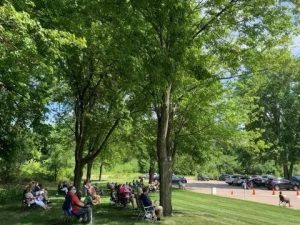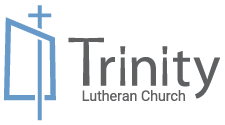Outdoor Worship next Sunday, May 2, at 10:45 a.m.
Beloved community,
 Trinity’s worship and music leaders determined this past winter that we would seek to again offer first Sunday of the month outdoor worship services on the west lawn in 2021. That outdoor worship option begins next Sunday, May 2. Our outdoor worship services were well received as we began to make our way through the early months of the pandemic in 2020, and some suggested that the goodness of being together in worship on the church campus should continue even when our COVID-19 separation is over.
Trinity’s worship and music leaders determined this past winter that we would seek to again offer first Sunday of the month outdoor worship services on the west lawn in 2021. That outdoor worship option begins next Sunday, May 2. Our outdoor worship services were well received as we began to make our way through the early months of the pandemic in 2020, and some suggested that the goodness of being together in worship on the church campus should continue even when our COVID-19 separation is over.
If you would like to gather for indoor worship next Sunday, plan to attend the 8 a.m. traditional service or the 9:15 a.m. Rejoice service. The 9:15 a.m. service will be live streamed as usual. The 10:45 a.m. service will be on the west lawn in the shadow of the Cross Tower. Please plan to wear a mask, keep distancing, and bring your own outdoor chair. This brief service of Holy Communion will include the Confirmation of our 2020 Confirmands, those whose celebration in May of 2020 was postponed in the early days of our pandemic separation. Because we have those Confirmands and their families planning their Sunday, May 2 Confirmation celebration, Pastor Dan has arranged for a large tent on the west lawn to provide shelter in case of inclement weather. Join us, rain or shine, as we gather for worship on the west lawn. We will even be blessed with the gift of song as Rejoice musicians lead us in our outdoor worship celebration.
The Bible and Creation Care
While Earth Day is receding in the rearview mirror, have you considered what it is that the Bible has to say about creation care, our stewardship of this beautiful planet? From Genesis to Revelation, we have a call to that caring stewardship as a way of life.
The two creation stories in Genesis, the seven-day creation hymn in chapter one and the Garden of Eden story in the next three chapters, different as they are, share a common central ‘creation care’ theme: humanity as the guardian and gardener of creation. In the first account, we’re cast as custodians, created in God’s image precisely so we can be creatively hospitable to the world God has just creatively, hospitably made. Accordingly, God grants humankind “dominion” — but only in the context of this larger call to stewardship. “Let them have dominion over” may just as well be translated, “Let them have custody of . . .” or “Let them have responsibility for . . .” Literally, the Hebrew in Genesis 1:26 is “Let them rule over,” is an allusion to ancient Near Eastern kingship, an ideal kingship of benevolent oversight — but remember, the first 25 verses of Genesis have also just laid out in vivid detail what true monarchy really looks like: God’s graceful creation of a beautiful home, and a household of creatures meant to live and thrive and multiply.
Likewise, in the second creation story we’re cast as gardeners, created by God expressly so the Garden of Delight may flourish (“Eden” likely means “delight”), full of fruit trees and countless other creatures. The story of humanity’s fall away from God, then, is the story of our fall away from our calling as creation’s gardener. In other words, according to Genesis 2-3, a primary consequence of human sin is our loss of this original role, this “tilling and keeping” of the earth (Genesis 2:15). In that sense, salvation invites our return to good gardening!
The Noah story, at its heart, is a retelling of creation itself, a “do-over” precipitated by the fact that the world had become “filled with violence” (Genesis 6:11). For the authors of Genesis, who knew accounts of a primordial, devastating, divinely caused flood that were common in the Near Eastern world, the existence of such a flood was taken for granted. The open questions were: What does the flood say about God? About creation? About us?
To ancient eyes, several things would have stood out about the flood story’s answers to these questions. First, that the waters rose not because God loves violence, but on the contrary, because God was so aggrieved by the pandemic of violence on earth. Second, that after the flood, God makes a covenant with the earth and all its creatures (including but not limited to humanity), forswearing such destruction forever. And third, that the human role in the drama is a decisive return to our original calling: to serve and protect God’s creatures, building an ark to house them, gathering food to feed them, and thus preserving the world’s biodiversity — in short, “to keep them alive with you . . . so that they may abound on the earth” (Genesis 6:19, 8:17).
When the authors of Leviticus and Deuteronomy envisioned the Sabbath day and the sabbatical year, they included domestic and wild animals, and even the land itself, as beneficiaries of these times of rest (see Leviticus 25:4-7, Deuteronomy 5:14-15). Likewise, the Psalms are full of passages underscoring that the earth and its many creatures belong to God, and that God delights in them and cares for them every day (for example, Psalm 104:1-15).
Jesus picks up on these themes: every creature, he insists, even the wildflowers and the smallest sparrows, are under God’s active, loving care (Matthew 6:25-29, Luke 12:6). Jesus warns against the perils of hoarding money and possessions, arguing that what money is for (and by extension, what economies are for) is building up the health of the wider beloved community (Luke 16:1-13). And finally, near the end of the Gospel of Matthew, Jesus completes and sums up his public teaching ministry with a vivid, haunting parable.
What he doesn’t say in this parable is significant. He doesn’t conclude his years of teaching by saying, “When the last judgment comes, the distinguishing mark between the sheep and the goats will be that the sheep have all the right theological opinions,” or that, “the sheep are generous to their inner circles of friends and family,” or that, “the sheep attend church every Sunday.” Instead, he says those on the side of the sheep do six specific things: they feed the hungry, give drink to the thirsty, welcome the stranger, clothe the naked, care for the sick, and visit people in prison (Matthew 25:31-46).
In a recent blog, Matthew Myer Boulton writes of the climate care imperative, proceeding from The Last Judgment parable of Matthew 25, that people of faith face:
The climate crisis, if we allow it to continue, will devastate each of these six groups — indeed, it’s already doing so today. Extreme weather, famine, and disease threaten the impoverished and disenfranchised first of all and most of all. We are currently living through a refugee emergency around the world, but the climate crisis promises to create waves of desperate migration that will dwarf today’s challenges — and that, in turn, will intensify authoritarian politics, incarceration rates, and the likelihood of war. When it comes to “the least of these,” the climate crisis is indeed the perfect storm. Taking Jesus seriously means confronting it with vigor, resolve, and lifelong commitment.
Finally, near the end of the Book of Revelation, the prophet poetically describes a “new heaven and new earth” — but strikingly, the vision isn’t of somewhere else, some new paradise set apart from the planet we know and love. Rather, the vision is of heaven descending down to earth. The “New Jerusalem” doesn’t entail leaving the old one behind. God made and dearly loves the earth, and made us to help protect it, to help serve it, and ultimately, by God’s grace, to help restore it.
“Thy kingdom come, thy will be done, on earth as it is in heaven . . .”
Friends in Christ, the climate crisis of our time directly calls upon the guardians and gardeners God created to respond with lives of faithful stewardship of creation. May we find inspiration in scripture for such vocation in our time.
Blessings good people of Trinity. May you be safe, may you be well, and may you be held in love.
It remains a privilege to serve as one of your pastors.
Grace and peace,
Pastor Robert Linstrom


